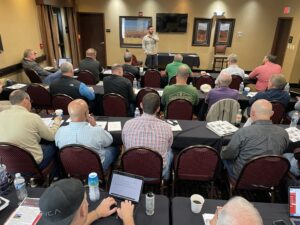WEEK OF PRAYER: ‘I’ve wondered if there was something else out there’
SOUTH AMERICA (BP) -- Grace, a member of one of the indigenous tribes of South America, speaks with intensity about the future of her people. There are outsiders who would keep them in something of a museum -- as living history, she says -- stuck in a time that has not been a reality for generations.
WEEK OF PRAYER: BE His hands, His voice
WEEK OF PRAYER: One man’s trash is another’s treasure
CAIRO (BP) -- A wise man builds his house upon rock; a foolish man builds his house upon sand. On the outskirts of Cairo, approximately 300 people have built their houses upon trash.
But amid the stench and squalor of shifting garbage, God is building a church on a firm foundation. Desperate for shelter on the outskirts of Cairo, residents use whatever they can find -- sheets of tin and discarded cardboard -- to create makeshift residences within this garbage village. For more than 20 years, families living here have collected trash from area homes and businesses to make some cash. It is estimated that the 17 million people of greater Cairo throw away 13,000 tons of garbage every day. Men rise early in the mornings to gather refuse and transport it back to their community in weathered pickup trucks or overflowing carts pulled by horses or donkeys. Some businesses bring the garbage to them. "Society looks down [on us]," says Joseph,* 31, who has lived in this slum for 14 years. "The smell is not good, the environment is not good." Regardless, he says, he has a message for fellow residents in one of Egypt's poorest areas: "You are not garbage." Family business Joseph's family moved to this garbage village from Asyut, Egypt, when he was 15. His father was a garbage collector and believed relocating closer to Cairo would offer more job opportunities. Believing education was key to a better future, Joseph was determined to go to school. His parents sent him back to Asyut to live with his grandmother during the school year until he finished high school. It was during his teens that Joseph began attending a Bible study. As he read the Scriptures, Joseph felt God transforming his life -- in more ways than one. He realized his worth in Christ was greater than his circumstances in the dump. At 18, he became a believer and the study group leader began mentoring him. He also began attending a nearby seminary. It was around this time that a neighborhood girl caught Joseph's eye. Hiba*, who was born and raised in the garbage village, was a Christian when she met Joseph at a home Bible study. The two dated for five years before marrying. As Joseph studied the Bible, the verses about God choosing the poor of the world to shame the rich resonated with him. Though he and Hiba had dreams of bettering their circumstances, God made it clear He wanted them to serve among their community. "God put in my heart to build a church here," Joseph says. "That has been my dream since [becoming a believer] 10 years ago." First worship service In June 2011, Joseph saw his dream realized. He and several other believers began building a church from discarded cinderblocks and mud. A local Egyptian Baptist church heard about the undertaking and offered leadership and financial support. On Dec. 30, 2011, the church held its first worship service under a partial roof. Since that first service, three people have prayed to receive Christ. This gives Southern Baptists reason to celebrate. Southern Baptist workers in North Africa and the Middle East are training Joseph and local pastors in outreach and evangelism and providing them with needed resources to support church plants.Black missionary relates to Zambians’ struggles
LUSAKA, Zambia (BP) -- When Troy Lewis came to Zambia, more than 10 years ago as an IMB missionary, he already had an intuitive understanding of many Zambians' struggles.
He helps Zambians care for AIDS patients
LUSAKA, Zambia (BP) -- Troy Lewis' deep, melodic voice is brimming with emotion as he talks about the people of Zambia. The IMB missionary's heart became burdened for sub-Saharan Africa during his college and seminary studies.
WEEK OF PRAYER: South African youth turn from despair
CAPE TOWN, South Africa (BP) -- It's hard not to be happy around 12-year-old Olwetu. She greets visitors with an infectious smile and sparkling eyes. Usually surrounded by friends, the outgoing South African seventh-grader is constantly smiling, laughing and talking.
But this is not typical behavior among Olwetu's peers -- hopeless is the best word to describe youth from the nation's Xhosa minority in the slums of Cape Town. Most young people here must deal with a myriad of issues -- abuse, violence, drugs, gangs, rape, loss of one or both parents, poor education, HIV/AIDS, poverty. These problems have far-reaching tentacles affecting every family in the township. "We began to see students that were asking ... 'What do I do when I've been raped by my uncle?' 'What do I do when my father and mother are abusing me?' 'I don't have any food at home.' 'My mom and dad don't have work.' 'My mom and dad are dead and I live with my aunt,'" said Bruce Erickson, a Southern Baptist missionary in Cape Town. "There are so many kids that live in such difficult situations without hope. They don't see a future for themselves here in South Africa. They don't see a future for themselves in their homes." Originally from California, Erickson and his wife Sheri have served in South Africa for nearly four years; they have three children, one of whom is in the U.S. attending college. Focused on reaching Xhosa youth in Cape Town with the love of Christ, the Ericksons use their educational skills to interact with the students at their schools. Thirty percent of South Africa's population is age 15 and under, compared to only 13 percent in the U.S., according to the Kaiser Family Foundation, a nonprofit that focuses on health care issues in the U.S. and abroad. "What an incredible opportunity for us to reach a huge part of this population and really have a chance to impact a nation for Christ," Sheri said. The Ericksons lead a project for OneLife, an International Mission Board initiative to connect students in the United States with missions projects around the world. The Cape Town project's goal is to minister to South African learners -- primary and secondary school students. "We teach life orientation classes, which is sex education, character building, being a good citizen and also learning how to deal with bullies and gangs and abuse -- different things that the kids would face in their life," said Sarah Cowan, a journeyman missionary from South Carolina. She and Michal Mitchell, a journeyman from Illinois, have been assisting the Ericksons in the youth ministry. "After school, we have leadership clubs or girls [and boys] clubs, worship services...WEEK OF PRAYER: Former atheist shuns fear by ‘walking together’ with God
CENTRAL ASIA (BP) -- Omar Khan* loved his father but rejected his religion. In his early 30s, Khan was a self-proclaimed atheist. He didn't believe in any god, especially Allah. Khan would listen out of respect as his father waxed philosophical about the Quran's mysteries during their frequent road trips to the city to buy merchandise for the family's small clothing shop.
WEEK OF PRAYER:
Cancer becomes one of God’s ‘greatest gifts’ to IMB missionary
DURBAN, South Africa (BP) -- Roger Hesch should be dead. After stage 4 bone marrow cancer decimated his body, his recovery encountered several life-threatening setbacks, each of which should have overpowered his ravaged immune system. Doctor after doctor told him the chances of survival were next to nothing. ![]() But God had more for Roger to do. Years earlier, after graduating from high school in his hometown of Little Falls, Minn., Roger spent a year in South Africa as part of an international exchange program in Johannesburg that exposed him "to the bigger world," he said. He and his wife Meg met while attending college in Minneapolis and were married in 1980. Early on, the couple made a commitment to say "yes" to God's leading, regardless of what that meant. They said "yes" to Roger attending seminary and pastoring two Southern Baptist churches. "In January 1986, I was speaking on the Great Commission and while I was preaching, God said, 'You can't encourage other people to do what you are not willing to do,'" Roger recalled. It was then the couple said "yes" to serving overseas as missionaries with the International Mission Board. "We said we'll go where other people can't or won't go," Roger said.
But God had more for Roger to do. Years earlier, after graduating from high school in his hometown of Little Falls, Minn., Roger spent a year in South Africa as part of an international exchange program in Johannesburg that exposed him "to the bigger world," he said. He and his wife Meg met while attending college in Minneapolis and were married in 1980. Early on, the couple made a commitment to say "yes" to God's leading, regardless of what that meant. They said "yes" to Roger attending seminary and pastoring two Southern Baptist churches. "In January 1986, I was speaking on the Great Commission and while I was preaching, God said, 'You can't encourage other people to do what you are not willing to do,'" Roger recalled. It was then the couple said "yes" to serving overseas as missionaries with the International Mission Board. "We said we'll go where other people can't or won't go," Roger said.
Cancer builds couple’s reliance on God
DURBAN, South Africa (BP) -- When Roger Hesch was diagnosed with bone marrow cancer, he immediately took it to the Lord -- who told him He was using the sickness to display His glory. ![]() "In the face of his illness, [Roger] set his face like flint, as it says of the Lord Jesus," his wife Meg said, "and [was] just determined to experience this with God ... and to not turn away from God in the face of his suffering."
"In the face of his illness, [Roger] set his face like flint, as it says of the Lord Jesus," his wife Meg said, "and [was] just determined to experience this with God ... and to not turn away from God in the face of his suffering."












